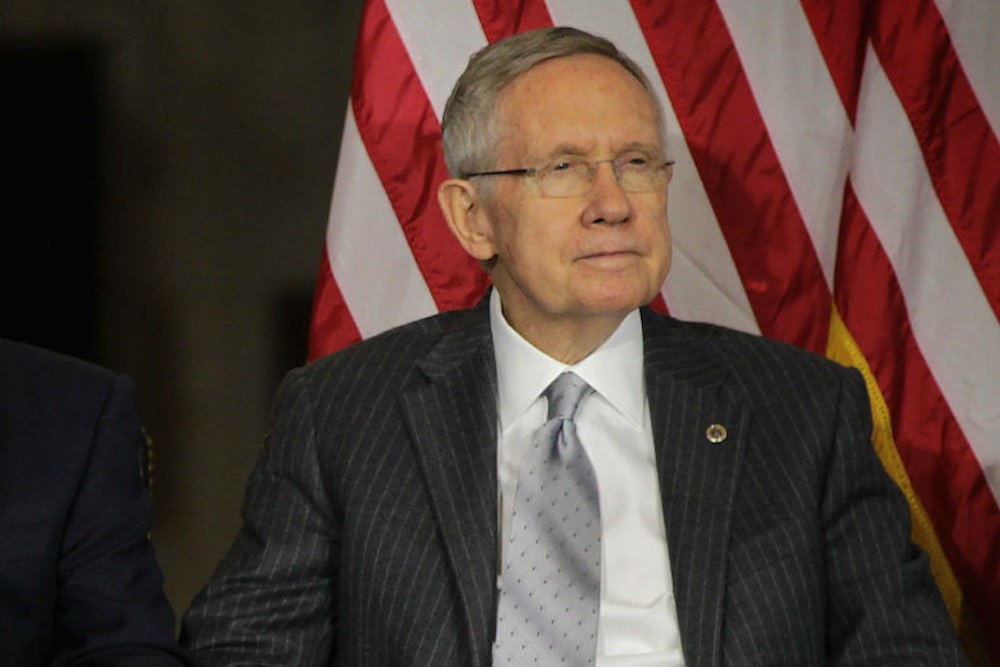It has been over two months since President Obama announced the United States was beginning operations to “degrade and ultimately destroy” the Islamic State. Ever since, the U.S. military has operated in a legal and moral limbo, fighting a new war against a new enemy under a Bush-era authority designed for Al Qaeda. With the start of a new, post-election session of Congress and President Obama’s announcement last week that he would seek new congressional authorization, the end of the precarious status-quo seemed imminent. But key senators now seem to be rejecting his call, insisting that “the next Congress is the one that needs to debate [on military action] and vote on it.”
Congress’s abdication of responsibility is an ongoing embarrassment, but with the White House signaling that it might dramatically expand military operations, congressional inaction now would be a travesty.
Since September, the president and Congress have engaged in a cynical dance of mutual avoidance over an authorization for force against the Islamic State. Obama fears that if he offers a draft, Republicans will use it to humiliate him; so he waits for Congress. Members of Congress, in turn, grumble that presidents have always initiated the process of authorization by drafting language for Congress’ consideration—and that Obama has sent nothing to the Hill.
This procedural posturing is also a convenient excuse for a risk-averse and dysfunctional Congress to evade responsibility. Why should a politician go on the record now for a military action that could end up as an anchor around his neck? A host of politicians had their ambitions dashed by the backlash against their support for the Iraq War. Why take a similar risk when you can stand on the sidelines, allow the president to muddle about by himself, and then cheer or critique in accordance to whichever way the political wind blows?
Congress’ allergy to responsibility sets a terrible precedent for unchecked presidential war power. Even worse, it represents a profound failure of their elected duty: Our leaders cannot duck responsibility for decisions of life and death, while American soldiers die and kill in our name. And we cannot wait until the next Congress. There are reports that Obama and his national security team are considering an expansion of the air campaign within Syria and a heightened effort to topple the Assad regime. Meanwhile, Chairman of the Joint Chiefs Martin Dempsey won't discount the return of American combat forces in Iraq.
Whatever one’s opinion on the removal of Assad and the deployment of ground troops, these are momentous decisions. In a democratic society, they should be debated and decided by the people’s representatives. By insisting on this, we protect ourselves from stumbling into disaster, and we ensure that our soldiers and servicemembers have the backing of the American people. That this process was absent from our decision to bomb the Islamic State is bad enough, but at least what we lacked in explicit congressional authorization was supplemented by widespread consensus.
There is no such consensus on the decisions that the United States must face in the coming weeks. Is the removal of Assad a necessary precondition to bringing Syria back from the abyss, or would removing him destabilize the country even further? Is the deployment of ground troops in Iraq essential to protecting American values and interests, or is it simply another foolhardy Middle Eastern adventure? These are precisely the sorts of questions that Congress must weigh in on, and its decisions should drive presidential policy.
But if Congress continues on its current path, being the lamest of ducks and refusing to act, Obama will simply make his own judgments. And when Congress is finally ready to discuss his draft for an authorization of military force, much of it will be a fait accompli. The White House will have determined where, who, and how America ought to fight, and legislators will simply be keeping up. That is not the constitutional structure the founders envisioned, and if Congress wishes to avoid it, now is the time to act. Waiting for another two months is not simply cowardly; it will also be too late.
